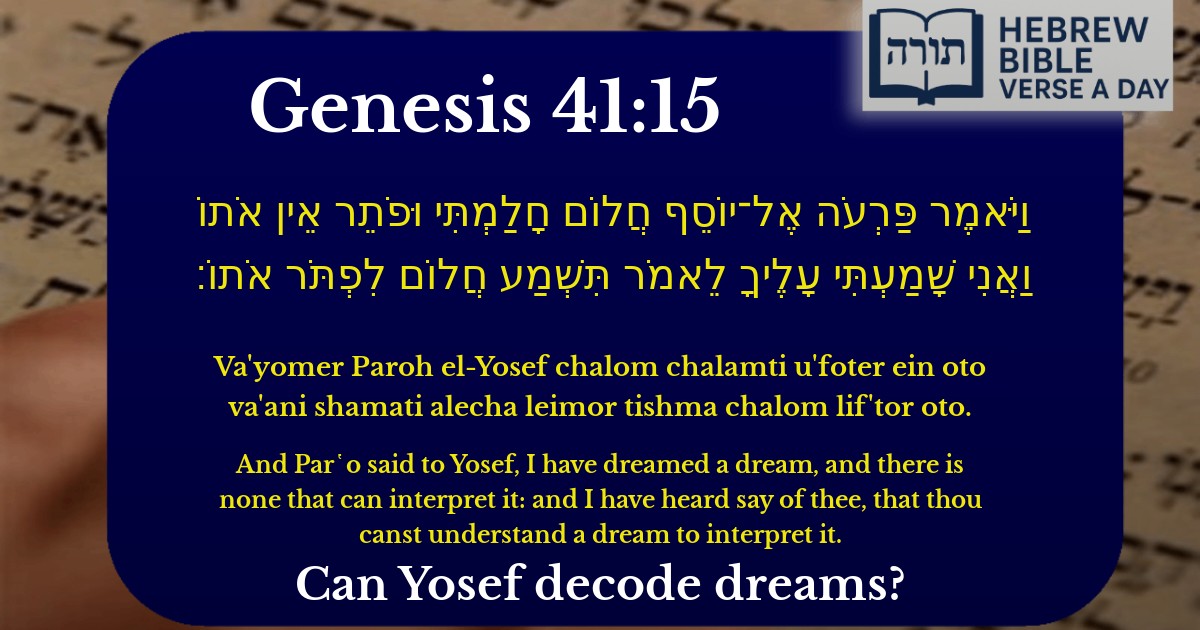Join Our Newsletter To Be Informed When New Videos Are Posted
Join the thousands of fellow Studends who rely on our videos to learn how to read the bible in Hebrew for free!
Hebrew Text
וַיֹּאמֶר פַּרְעֹה אֶל־יוֹסֵף חֲלוֹם חָלַמְתִּי וּפֹתֵר אֵין אֹתוֹ וַאֲנִי שָׁמַעְתִּי עָלֶיךָ לֵאמֹר תִּשְׁמַע חֲלוֹם לִפְתֹּר אֹתוֹ׃
English Translation
And Par῾o said to Yosef, I have dreamed a dream, and there is none that can interpret it: and I have heard say of thee, that thou canst understand a dream to interpret it.
Transliteration
Va'yomer Paroh el-Yosef chalom chalamti u'foter ein oto va'ani shamati alecha leimor tishma chalom lif'tor oto.
Hebrew Leining Text
וַיֹּ֤אמֶר פַּרְעֹה֙ אֶל־יוֹסֵ֔ף חֲל֣וֹם חָלַ֔מְתִּי וּפֹתֵ֖ר אֵ֣ין אֹת֑וֹ וַאֲנִ֗י שָׁמַ֤עְתִּי עָלֶ֙יךָ֙ לֵאמֹ֔ר תִּשְׁמַ֥ע חֲל֖וֹם לִפְתֹּ֥ר אֹתֽוֹ׃
וַיֹּ֤אמֶר פַּרְעֹה֙ אֶל־יוֹסֵ֔ף חֲל֣וֹם חָלַ֔מְתִּי וּפֹתֵ֖ר אֵ֣ין אֹת֑וֹ וַאֲנִ֗י שָׁמַ֤עְתִּי עָלֶ֙יךָ֙ לֵאמֹ֔ר תִּשְׁמַ֥ע חֲל֖וֹם לִפְתֹּ֥ר אֹתֽוֹ׃
🎵 Listen to leining
Parasha Commentary
📚 Talmud Citations
This verse is quoted in the Talmud.
📖 Berakhot 55b
The verse is referenced in a discussion about dreams and their interpretations, illustrating Joseph's ability to interpret dreams as a divine gift.
📖 Chullin 95b
Mentioned in the context of discussing the nature of dreams and the qualifications needed to interpret them, using Pharaoh's statement to Joseph as an example.


Pharaoh's Recognition of Yosef's Divine Gift
The verse (Bereishit 41:15) describes Pharaoh acknowledging Yosef's unique ability to interpret dreams. Rashi explains that Pharaoh had heard about Yosef's reputation from the chief butler, who testified that Yosef's interpretations were accurate because they were divinely inspired. The phrase "תִּשְׁמַע חֲלוֹם לִפְתֹּר אֹתוֹ" ("you can understand a dream to interpret it") implies that Yosef did not rely on human wisdom but on divine insight (Rashi on Bereishit 41:15).
The Limitations of Egyptian Dream Interpreters
Pharaoh states, "וּפֹתֵר אֵין אֹתוֹ" ("there is none that can interpret it"), indicating that his court magicians and wise men failed to provide a satisfactory explanation. The Midrash (Bereishit Rabbah 89:6) elaborates that they offered interpretations, but none resonated with Pharaoh because they lacked divine truth. This highlights the distinction between human conjecture and genuine prophecy or divine insight, which Yosef possessed.
Yosef's Humility and Attribution to Hashem
While the verse focuses on Pharaoh's words, the broader context (see Bereishit 41:16) shows Yosef immediately redirecting credit to Hashem, saying, "בִּלְעָדָי אֱלֹהִים יַעֲנֶה אֶת־שְׁלוֹם פַּרְעֹה" ("It is not in me; G-d will give Pharaoh a favorable answer"). Rambam (Hilchos Yesodei HaTorah 7:1) emphasizes that true prophecy or divine insight must be accompanied by humility and acknowledgment of its divine source, as demonstrated by Yosef.
The Significance of Dreams in Torah
The Talmud (Berachos 55b) teaches that dreams are a form of minor prophecy, and their interpretation requires divine assistance. Yosef's ability to interpret dreams accurately—first for the butler and baker, and now for Pharaoh—demonstrates his role as a conduit for divine communication. The Midrash (Tanchuma Vayeishev 4) further connects Yosef's dream interpretation to his broader mission of sustaining the world during famine, as foreshadowed in his own dreams earlier in the parsha.